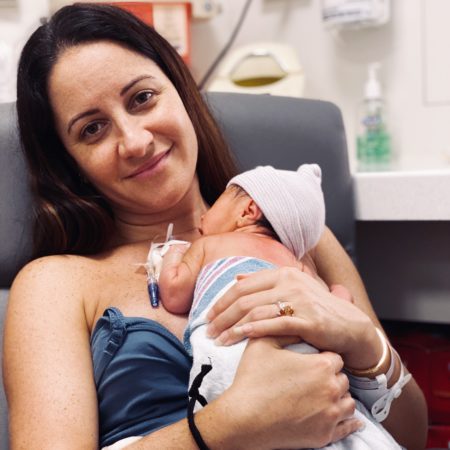 Valentina Antonia’s Birth Story My Third Trimester My Second Trimester Gender Reveal: It’s a … Our Big Island Babymoon My First Trimester Our Infertility Journey: We’re Having a Baby! Our Infertility Journey: The IVF Decision Our Struggle with Infertility Many people have asked me what it’s like to have a baby in the NICU. Every parent’s experience is different based on their unique circumstances, length of stay and their baby’s course of treatment, but I’m sure I can speak for most parents when I say that it’s a place we all never thought we’d be. When I was pregnant and choosing my OBGYN, I toured a couple of hospitals. At Lenox Hill, they walked us by the NICU and I clearly remember blocking out that part of the tour thinking it didn’t apply to me. I even recall advice from my sister to choose a hospital with a reputable NICU “just in case” and again thinking to myself that it was irrelevant. So when I delivered our daughter at 34 weeks and 5 days pregnant, you can imagine my shock when having a baby in the NICU became all too real. Based on my personal experience, this is what it’s like to have a baby in the NICU. One // I have never been more scared. After I delivered Valentina, she was taken to the NICU. I was so relieved that she had arrived and exhausted from labor that what was about to become our reality didn’t set in until hours later when I was settled into my room. The first night, we visited her in the NICU and I completely broke down. At that point, so early on, I needed to know my baby was going to be ok and altough the medical team told me she would be, I feared the unknown. Two // I was constantly worried. Over the course of her stay in the NICU, Valentina was on a breathing machine, received a blood transfusion for anemia, a course of antibiotics for possible infection, placed under light therapy for jaundice, suffered a minor brain bleed (this can potentially be dangerous but it was minor and resolved on its own), was fed through a tube and received fluids through a line in her belly button. Seeing my days-old daughter endure so much while helplessly standing by waiting for test results took its toll. Three // I spent my days in the NICU. When your baby is in the NICU, there’s nowhere else you want to be. Everyday I arrived for morning rounds and often stayed into the evening only taking a break to eat lunch. Other times I went home for an afternoon nap and went back later in the evening with David. The days were long and monotonous. I spent my time there, holding my baby to make up for the skin to skin time we didn’t have at birth, changing her diaper, feeding her and pumping. Four // The monitors haunted me. Every baby in the NICU is hooked up to a monitor that measures heartrate, oxygen saturation and other vital signs. These monitors beep continuously and when the numbers dip too low or too high they ding loudly creating a constant cacophany of alarms and bells. As I held my baby I too often fixated on the numbers to the point of obsession and when I left I could still hear the monitors in my sleep. Five // I blamed myself. As much as I wanted to believe that Valentina’s premature birth was an act of nature, I blamed myself for not being able to keep her safe inside me and carry my pregnancy to term. In this post I mentioned mourning the remainder of a pregnancy I didn’t get to experience and this was a big part of my guilt. Six // I couldn’t have the postpartum experience I had hoped for. If all goes well, many families will room-in with their baby during their hospital stay and upon discharge two to three days later, take their baby home with them where they’ll comfortably continue postpartum recovery and experience their baby’s first weeks as a family. For us, this was not the case. My postpartum recovery happened in the NICU and when we went home each night to sleep, our baby wasn’t there with us. Seven // I felt loved. As much as I’ve shed light on the dark side of what it’s like to have a baby in the NICU, I want to acknowledge that despite everything that was going on, I’ve never felt so loved and cared for as a family by the NICU staff. From a special nurse who grew fond of Valentina, the medical team who did rounds every morning and took all the time we needed to answer our questions, the occupational therapist who took the time to get to know me and finally the social worker who checked in on me regularly and even sent a chaplain to give Valentina a blessing, these are the people who made our stay comfortable and ensure we felt seen, heard and informed during a difficult time. My hope is that you’ll never have to experience what it’s like to have a baby in the NICU. If you do find yourself in such a place, use these tips:
Valentina Antonia’s Birth Story My Third Trimester My Second Trimester Gender Reveal: It’s a … Our Big Island Babymoon My First Trimester Our Infertility Journey: We’re Having a Baby! Our Infertility Journey: The IVF Decision Our Struggle with Infertility Many people have asked me what it’s like to have a baby in the NICU. Every parent’s experience is different based on their unique circumstances, length of stay and their baby’s course of treatment, but I’m sure I can speak for most parents when I say that it’s a place we all never thought we’d be. When I was pregnant and choosing my OBGYN, I toured a couple of hospitals. At Lenox Hill, they walked us by the NICU and I clearly remember blocking out that part of the tour thinking it didn’t apply to me. I even recall advice from my sister to choose a hospital with a reputable NICU “just in case” and again thinking to myself that it was irrelevant. So when I delivered our daughter at 34 weeks and 5 days pregnant, you can imagine my shock when having a baby in the NICU became all too real. Based on my personal experience, this is what it’s like to have a baby in the NICU. One // I have never been more scared. After I delivered Valentina, she was taken to the NICU. I was so relieved that she had arrived and exhausted from labor that what was about to become our reality didn’t set in until hours later when I was settled into my room. The first night, we visited her in the NICU and I completely broke down. At that point, so early on, I needed to know my baby was going to be ok and altough the medical team told me she would be, I feared the unknown. Two // I was constantly worried. Over the course of her stay in the NICU, Valentina was on a breathing machine, received a blood transfusion for anemia, a course of antibiotics for possible infection, placed under light therapy for jaundice, suffered a minor brain bleed (this can potentially be dangerous but it was minor and resolved on its own), was fed through a tube and received fluids through a line in her belly button. Seeing my days-old daughter endure so much while helplessly standing by waiting for test results took its toll. Three // I spent my days in the NICU. When your baby is in the NICU, there’s nowhere else you want to be. Everyday I arrived for morning rounds and often stayed into the evening only taking a break to eat lunch. Other times I went home for an afternoon nap and went back later in the evening with David. The days were long and monotonous. I spent my time there, holding my baby to make up for the skin to skin time we didn’t have at birth, changing her diaper, feeding her and pumping. Four // The monitors haunted me. Every baby in the NICU is hooked up to a monitor that measures heartrate, oxygen saturation and other vital signs. These monitors beep continuously and when the numbers dip too low or too high they ding loudly creating a constant cacophany of alarms and bells. As I held my baby I too often fixated on the numbers to the point of obsession and when I left I could still hear the monitors in my sleep. Five // I blamed myself. As much as I wanted to believe that Valentina’s premature birth was an act of nature, I blamed myself for not being able to keep her safe inside me and carry my pregnancy to term. In this post I mentioned mourning the remainder of a pregnancy I didn’t get to experience and this was a big part of my guilt. Six // I couldn’t have the postpartum experience I had hoped for. If all goes well, many families will room-in with their baby during their hospital stay and upon discharge two to three days later, take their baby home with them where they’ll comfortably continue postpartum recovery and experience their baby’s first weeks as a family. For us, this was not the case. My postpartum recovery happened in the NICU and when we went home each night to sleep, our baby wasn’t there with us. Seven // I felt loved. As much as I’ve shed light on the dark side of what it’s like to have a baby in the NICU, I want to acknowledge that despite everything that was going on, I’ve never felt so loved and cared for as a family by the NICU staff. From a special nurse who grew fond of Valentina, the medical team who did rounds every morning and took all the time we needed to answer our questions, the occupational therapist who took the time to get to know me and finally the social worker who checked in on me regularly and even sent a chaplain to give Valentina a blessing, these are the people who made our stay comfortable and ensure we felt seen, heard and informed during a difficult time. My hope is that you’ll never have to experience what it’s like to have a baby in the NICU. If you do find yourself in such a place, use these tips:
- Spend as much time there as you can, but don’t feel guilty about taking some time off to take care of yourself – whether it’s a lunch break, time for a nap, a manicure or a full day off for your mental well-being.
- Take an active role in your baby’s care – learn the NICU’s feeding schedule so you can be there to help with feedings, change your baby’s diapers and help the nurse with anything else you can.
- Know when the medical team does morning rounds. Plan to be there for daily updates on your baby’s progress and to get your questions answered.
- Likewise, know when the NICU restricts visitor access if they do (usually 30 minutes in the morning and the evening during the change of shifts) so you can plan your visits accordingly.
- Find out if the NICU offers support groups for parents and plan to attend if they do.
]]>



[…] from labor and delivery in the tiny bathroom of a hospital waiting room. You can read more about what it’s like to have a baby in the NICU here. Looking back, this experience set the stage for a lot of the anxiety I experienced in the months […]